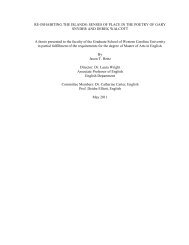SUMMERS, KAREN CRADY, Ph.D. Reading Incest - The University ...
SUMMERS, KAREN CRADY, Ph.D. Reading Incest - The University ...
SUMMERS, KAREN CRADY, Ph.D. Reading Incest - The University ...
Create successful ePaper yourself
Turn your PDF publications into a flip-book with our unique Google optimized e-Paper software.
42<br />
and Machaire, and at the same time he denounces Eolus’s unreasonable wrath. <strong>The</strong>re is<br />
an echo here of the earlier tale of Mundus, who was partially excused for his actions<br />
because he was overcome by lust and unable to control himself. Canace was judged (by<br />
Genius, at least) sympathetically because she also did only what was natural. Reason,<br />
God-given, is meant to be used to temper all violent swings of human emotion and for<br />
effective self-rule, and Genius is affronted by Eolus’s disregard as he was by the knowing<br />
violation of Paulina’s trust by the priests. Genius counsels Amans that “wrath is a more<br />
heinous sin than lust because it violates the law of kynde. . . . Genius’s argument, of<br />
course, conforms to the medieval hierarchy of the Deadly Sins; lust is the least<br />
reprehensible because the most natural” (ibid.). Thus sibling incest highlights division of<br />
man from the angelic part of himself in this tale because Eolus has lost his capacity to<br />
moderate his wrath, and he acts in a most unkynde fashion.<br />
<strong>The</strong> story of Orestes contrasts the tale of Canace. Orestes’ mother Climestre<br />
murdered his father Agamemnon upon his return from the Trojan War, 13 unbeknownst to<br />
Orestes, as he was raised by another family. When as an adult he hears this story he<br />
vows vengeance. Climestre married another man, incestuous Egiste who slept with his<br />
daughter, forsaking her for Orestes’ mother. Orestes finds his mother and kills her<br />
according to his vow. He brought her before the city council and publicly accused her:<br />
O cruel beste uinkind,<br />
How mihtest thou thin herter finde<br />
For eny lust of loves drawhte,<br />
13 According to Homer, Climestra (Clytemnestra) killed Agamemnon in retribution for his having sacrificed<br />
their daughter Iphigeneia to the gods in exchange for winds to get them home from becalmed seas;<br />
Agamemnon also brought home with him a concubine, Cassandra.
















